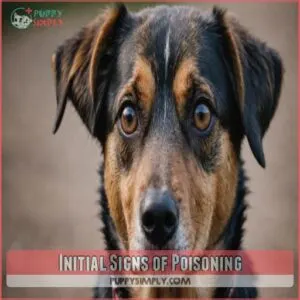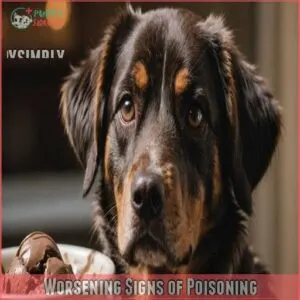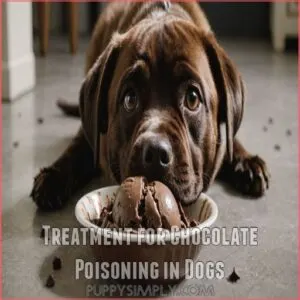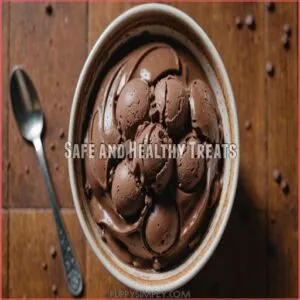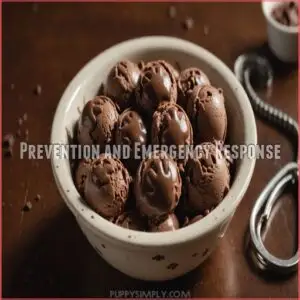This site is supported by our readers. We may earn a commission, at no cost to you, if you purchase through links.

The sweet treat might sound tempting, but it contains theobromine and caffeine—compounds found in chocolate that are toxic to dogs and can lead to serious health issues.
Just like how we’d avoid giving a toddler a triple espresso, it’s best to keep these dangers out of your furry friend’s bowl.
Chocolate ice cream also packs high sugar and fat, which aren’t good for dogs either.
Look for dog-friendly treats that won’t put your pet’s health at risk.
Curious about safe alternatives?
You might just discover a tasty surprise your dog will love!
Table Of Contents
- Key Takeaways
- Dangers of Chocolate Ice Cream
- Can Dogs Eat Chocolate Ice Cream?
- Signs and Symptoms of Chocolate Poisoning
- Treatment for Chocolate Poisoning in Dogs
- Why Chocolate Ice Cream is Bad for Dogs
- Alternatives to Chocolate Ice Cream for Dogs
- Prevention and Emergency Response
- Frequently Asked Questions (FAQs)
- What to do if your dog eats chocolate ice cream?
- Can dogs eat chocolate?
- Is ice cream bad for dogs?
- Can chocolate ice cream make a dog sick?
- Can dogs eat coffee flavored ice cream?
- Can dogs eat vanilla ice cream?
- Can I let my dog lick my chocolate ice cream bowl?
- How much chocolate is toxic to a dog?
- What happens if a dog eats the tiniest bit of chocolate?
- Will one piece of chocolate hurt my dog?
- How long does chocolate toxicity last in dogs?
- Can chocolate cause long-term health issues in dogs?
- How to safely dispose of chocolate around pets?
- What other foods are toxic to dogs?
- How is theobromine metabolized in dogs?
- Conclusion
Key Takeaways
- White chocolate, like in some chocolate ice cream flavors, contains theobromine, a toxin dogs cannot metabolize, leading to vomiting and diarrhea issues. Don’t let your dog eat chocolate ice cream, it contains theobromine and caffeine, which are toxic to dogs.
- Watch for symptoms of chocolate poisoning like vomiting, diarrhea, or tremors, and get veterinary help immediately if needed.
- Opt for dog-safe treats instead of chocolate ice cream to keep your pet healthy and happy.
- Store chocolate ice cream securely out of your dog’s reach to prevent accidental ingestion.
Dangers of Chocolate Ice Cream
That seemingly innocent scoop of chocolate ice cream holds hidden dangers for your furry friend.
Chocolate contains theobromine, a compound toxic to dogs, and even a small amount can cause serious health problems, so keep it out of reach!
Theobromine and Caffeine
Regarding chocolate ice cream and dogs, the dynamic duo of danger is theobromine and caffeine.
These ingredients, such as those found in highly sweetened foods like Pop-Tarts ingredients, aren’t just pick-me-ups for people; they pose serious dog health risks.
If you suspect theobromine poisoning in your dog, you can find helpful products and resources at theobromine dog care.
Theobromine poisoning results
Methylxanthine Toxicity
You’ve heard about theobromine, but the true villain lurking in chocolate ice cream is methylxanthine toxicity.
It’s not just a mouthful—it’s a genuine threat to your dog’s health.
High levels disrupt methylxanthine metabolism, leading to chocolate toxicity risk factors like restlessness and even seizures.
Keep these issues at bay by practicing chocolate toxicity prevention.
Watch for:
- Dog breed sensitivity
- Chocolate consumption
- Theobromine poisoning symptoms
- Safe treat alternatives. If you’re considering treats like ice cream, remember that even human-friendly desserts like cake can be toxic to dogs, especially those containing chocolate and xylitol
Chocolate Ice Cream Variations and Toxicity
Not all chocolate ice cream sings the same tune in terms of toxicity risk, thanks to varying chocolate brands and ice cream types.
These variations can spell trouble, slipping toxic chocolate into your pup’s unsuspecting paws.
Theobromine levels fluctuate, and that means ice cream toxicity in dogs isn’t a one-size-fits-all situation.
Whether it’s chocolate toxicity or xylitol poisoning, different ingredients can trigger dog sensitivity, leading to potential illness like dog pancreatitis.
Stay vigilant.
Can Dogs Eat Chocolate Ice Cream?
Is chocolate ice cream safe for dogs? Imagine this: your pup’s big eyes begging for a scoop, but giving in can lead to a world of trouble.
Chocolate ice cream brands often contain theobromine, which spells disaster for dogs. They’re sensitive to chocolate toxicity, even in small amounts, leading to potentially severe health issues.
If you’re considering a sweet treat, check out safe ice cream options for dogs.
Instead, whip up some homemade frozen treats with dog-safe ice cream recipes.
Remember, prevention trumps all! Protect your furry friend with steps like chocolate poisoning prevention and pet health insurance.
Signs and Symptoms of Chocolate Poisoning
When your dog sneaks a taste of chocolate ice cream, watch out for signs of chocolate poisoning like vomiting, diarrhea, or increased thirst, as these symptoms can escalate quickly.
In severe cases, you might notice tremors or restlessness, which are your cue to get veterinary help pronto.
Initial Signs of Poisoning
So, your furry pal sneaked some chocolate ice cream. Now what?
Early signs of chocolate poisoning in dogs can be subtle but concerning.
Keep an eye out for vomiting and diarrhea, as these might hint at trouble.
You might also notice restlessness, increased thirst, or tremors.
These symptoms aren’t just a stomachache—they’re signals that your dog needs help.
Stay alert to these red flags of ice cream toxicity in dogs.
Worsening Signs of Poisoning
Your pup’s initial restlessness might escalate.
You could see tremors developing, possibly even seizures.
Keep a close eye out for heart problems; rapid breathing is a serious sign.
These are all signs of worsening chocolate poisoning.
If you notice any of these symptoms, don’t delay – get to the vet ASAP!
Remember, a little chocolate can go a long way in causing big trouble for your furry friend.
Early intervention is key.
Don’t wait for things to get worse!
Effects of Fat and Sugar
Let’s talk about the sweet but sticky subject of chocolate ice cream and dogs.
Fat and sugar can take a toll on your pup’s metabolism, leading to issues like:
- Pancreatitis Risk: Too much fat can inflame your dog’s pancreas.
- Weight Gain: Extra pounds aren’t flattering or healthy.
- Dietary Concerns: Sugar doesn’t sit well and can lead to gums flapping quickly.
Opt for dog-friendly ice cream instead!
Treatment for Chocolate Poisoning in Dogs
If your dog sneaks a lick of chocolate ice cream, quick action can prevent a Paw-tragedy.
Treatment may involve inducing vomiting, administering activated charcoal, or managing symptoms like tremors and heart issues—ensure a vet guides the process for the best outcomes.
Inducing Vomiting and Activated Charcoal
If your dog devours chocolate ice cream, swift action might save the day.
Consider inducing vomiting to expel the toxin, but only with your vet’s green light, since timing and effectiveness matter.
Activated charcoal acts like a sponge, absorbing harmful substances.
It’s important to weigh risks and side effects, pinch humor with a "dogs eating ice cream" twist, and avoid pancreatitis.
Managing Vomiting and Diarrhea
Tackle vomiting and diarrhea from chocolate ice cream in dogs by keeping a clear plan. Start with these four steps:
- Hydration tips: Make sure your pooch drinks water.
- Dietary changes: Stick to bland food.
- Vet consultation: Always seek professional advice.
- Home remedies: Only use safe, vet-recommended options.
Chocolate’s a treat for humans, not dogs!
Treating Cardiac Dysfunction
Suspect cardiac dysfunction? Alongside belly troubles, watch for a racing heart.
Your vet might recommend cardiac monitoring and medication management to stabilize your dog’s condition. With proper care, the outlook can improve considerably.
Humor me—have you ever tried helping a dog with heart failure? It’s no walk in the park!
Keep your dogs safe; explore dog-friendly ice cream alternatives.
| Symptom | Recommend Actions |
|---|---|
| Increased Heart Rate | Cardiac Monitoring |
| Irregular Beat | Medication Management |
| Lifestyle Concerns | Lifestyle Changes |
| Prognosis Check | Regular Veterinary Visits |
Controlling Tremors and Seizures
Controlling tremors and seizures becomes top priority after stabilizing the heart.
Veterinary advice typically includes:
- Medications to reduce tremors
- Seizure management using specific anti-seizure drugs
- Monitoring your dog’s health closely
- Fluid therapy to prevent dehydration
- Supportive care to promote comfort
Chocolate effects can be nasty, but with quick emergency care, your furry friend can recover!
Why Chocolate Ice Cream is Bad for Dogs
That delicious-looking chocolate ice cream you’re eyeing?
It’s packed with theobromine, a compound toxic to your furry friend, and can cause upset stomachs, tremors, and even worse problems if ingested.
So, skip the chocolate ice cream and opt for a dog-friendly alternative to keep your pup happy and healthy.
Dairy Intolerance
Imagine enjoying a dessert, only to realize your furry friend can’t join in.
Chocolate ice cream is a double whammy for dogs due to dairy intolerance, similar to the dangers of pistachio ice cream treats.
Many dogs can’t digest lactose, leading to upset stomachs and possible dog obesity.
Consider dog ice cream alternatives or lactose-free options to maintain
Toxic Flavors and Ingredients
Regarding chocolate ice cream, the toxic ingredients are no joke.
If you’re looking for fun ways to celebrate your dog, consider chocolate ice cream dog gifts.
Chocolate contains theobromine, which is poisonous to dogs.
Not just that, xylitol and artificial sweeteners lurking in some ice creams can harm your furry friend too.
It
High Fat Content
Varied toxic flavors and ingredients make chocolate ice cream dangerous for dogs, but the high fat content takes it up a notch.
Just like us, Fido’s waistline and pancreas won’t appreciate the extra fat, risking pancreatitis and weight issues.
Imagine your pup struggling with fat digestion and you’ll see why experts tout fat-free alternatives and dog-friendly ice cream.
Protect your furry friend! Skip the treat; choose safer options.
Alternatives to Chocolate Ice Cream for Dogs
Instead of risking your dog’s health with chocolate ice cream, why not try some delicious and safe alternatives that both you and your pup will love?
Consider dog-friendly ice cream options made from simple ingredients, or whip up homemade treats for a wagging-tail approval.
Dog-Friendly Ice Cream Options
Everyone loves a frozen treat, but not all flavors are dog-friendly!
Thankfully, you’ve got options that keep tails wagging without the risks.
Dog-friendly ice cream brands or whip up homemade ice cream recipes.
Frozen yogurt alternatives and dairy-free options cater to pups with lactose intolerance and sensitivity.
Keep dogs safe with these delicious alternatives, avoiding chocolate entirely, and be aware that some desserts like cheesecake can also be toxic due to ingredients like xylitol in cheesecake, and giving you peace of mind during those sunny snack sessions.
Safe and Healthy Treats
Picture your pup’s eyes lighting up over dog-friendly snacks that are actually safe alternatives to chocolate ice cream.
Store-bought dogsafe ice cream, specifically made for canine nutrition, skips the lactose that many dogs can’t stomach, saving them from tummy troubles.
You can even find treats with healthy ingredients like peanut butter or pumpkin, ensuring your dog stays happy and healthy.
Offering these treats shows love in every bite and protects their wagging tails!
Homemade Dog Treat Recipes
Homemade peanut butter cookies without sugar, like those that can be a healthy alternative to donuts, are a great way to keep your dog treats simple. Many simple, healthy dog treats are easy to make at home.
You can find inspiration for dog ice cream recipes online or explore websites selling products related to dog ice cream recipes to get started.
Use safe ingredients like peanut butter (xylitol-free!), bananas, and oats for nutritional value.
Avoid common mistakes like adding grapes or onions—they’re toxic!
Find easy
Prevention and Emergency Response
To prevent mishaps with chocolate ice cream, always store it safely out of your dog’s reach, like you’d a secret stash of cookies from a curious toddler.
In case of accidental ingestion, contact your veterinarian or pet poison control hotline for immediate advice, because quick responses can save your furry friend’s life.
Storing Chocolate Ice Cream Safely
You might think storing chocolate ice cream is easy, but ensuring it’s safely out of your dog’s reach is key, as some ice cream ingredients, such as chocolate, are toxic to dogs.
Keep it at a consistent refrigerator temperature or freezer placement to prevent spoilage.
Use an airtight container to maintain freshness, and always check expiration dates.
Remember, even small amounts can be dangerous.
Educating Others About Chocolate Toxicity
While ensuring your chocolate stash is secure, understanding and sharing chocolate toxicity knowledge is essential.
As a responsible dog owner, clarity cuts through chocolate danger myths.
Do your part by spreading safety tips and educating fellow pet lovers.
A humorous touch can make your advice memorable, like "chocolate’s best left for heartbreaks, not Fido!"
- Learn pet first aid to handle emergencies.
- Discuss treat alternatives with friends.
- Highlight lactose intolerance in dogs.
Emergency Veterinary Care and Pet Poison Control Hotlines
It’s one thing to teach fellow dog lovers about chocolate’s risks, but when faced with an emergency, you need to act swiftly.
Keep emergency hotline numbers handy.
Poison control resources offer vital advice if your pup devours the wrong treat.
Veterans emergency contacts are lifesavers, providing urgent care options.
Remember, dog-friendly ice cream is better to avoid the dangers of regular ones, especially if your pooch is lactose intolerant.
Frequently Asked Questions (FAQs)
What to do if your dog eats chocolate ice cream?
Chocolate ice cream’s a no-no for pups! If your dog sneaks some, contact your vet immediately. Theobromine’s toxic; early intervention is key. Don’t wait—act fast!
Can dogs eat chocolate?
Dogs shouldn’t eat chocolate, as it contains theobromine, which is toxic to them.
Even small amounts can cause vomiting, restlessness, or more severe symptoms.
Keep in mind that beef treats like hot dogs high in fat and sodium, can be toxic alternatives, Always keep chocolate out reach and opt for safe dog treats instead.
Is ice cream bad for dogs?
Did you know that 10% of dogs are lactose intolerant?
Feeding ice cream to your furry friend might cause tummy troubles like diarrhea or vomiting.
Opt for dog-friendly treats instead, and keep your pup’s health in tip-top shape!
Can chocolate ice cream make a dog sick?
Yes, chocolate ice cream can make your dog sick due to the toxic theobromine in chocolate.
Even small amounts might cause vomiting, diarrhea, or worse.
It’s best to avoid any chocolate treats and play it safe.
Can dogs eat coffee flavored ice cream?
You might think coffee-flavored ice cream is harmless, but it can be toxic to dogs due to caffeine content.
This can lead to hyperactivity, restlessness, or worse.
Keep this treat for yourself and offer dog-safe options.
Can dogs eat vanilla ice cream?
Sure, your dog would love a scoop of vanilla ice cream just as you might enjoy a kale smoothie.
But, while vanilla ice cream isn’t toxic like chocolate, it’s still not advisable due to sugar and fat content.
Can I let my dog lick my chocolate ice cream bowl?
Letting your dog lick a chocolate ice cream bowl might seem harmless, but it’s a recipe for disaster.
Chocolate contains theobromine, which is toxic to dogs.
Keep your furry friend safe by avoiding any chocolate exposure.
How much chocolate is toxic to a dog?
Like a forbidden fruit, even a tiny bit of chocolate can be dangerous for your pup.
Theobromine’s toxic effects vary by dog size and chocolate type; any amount is risky.
Keep chocolate far away!
What happens if a dog eats the tiniest bit of chocolate?
When a dog eats even the tiniest bit of chocolate, it can cause vomiting, diarrhea, or restlessness due to theobromine, a toxic stimulant.
Always consult a vet immediately to make sure your furry friend’s safety.
Will one piece of chocolate hurt my dog?
About 28% of dog poisoning cases involve chocolate.
Even a small piece might harm your furry friend, as theobromine, found in chocolate, affects dogs differently.
Always err on the side of caution and consult your vet.
How long does chocolate toxicity last in dogs?
Chocolate toxicity in dogs can last anywhere from 6 to 72 hours, depending on the amount consumed, the dog’s size, and health.
You’re best off giving your vet a call for guidance right away!
Can chocolate cause long-term health issues in dogs?
Although your furry friend might recover from chocolate poisoning, long-term problems could still lurk, like heart issues or kidney damage.
Keep an eye out for symptoms, and always consult your vet if Fido sneaks chocolate.
How to safely dispose of chocolate around pets?
Keep chocolate secure by sealing it tightly in a trash bag.
Then, place it in a lidded garbage bin.
Store the bin in a dog-proof area.
These steps will prevent accidental chocolate consumption and keep your pet safe.
What other foods are toxic to dogs?
Well, nothing says "treat" like poisoning your pup with grapes or onions!
Besides chocolate, avocados, caffeine, alcohol, nuts like macadamias, and raisins top the don’t-eat list.
Keep your dog’s diet safe to prevent vet visits.
How is theobromine metabolized in dogs?
Dogs metabolize theobromine much slower than humans.
It builds up in their systems, causing problems.
That’s why even a little chocolate can be dangerous!
Always keep chocolate away from your furry friend.
Conclusion
So, can dogs eat chocolate ice cream? Absolutely not!
While it might seem harmless, that scoop could seriously harm your pup.
The toxic duo of theobromine and caffeine can wreak havoc on a dog’s system, causing symptoms from upset stomach to seizures.
Instead, treat your furry friend with dog-safe snacks.
Curious owners can explore a world of tasty alternatives that keep tails wagging without the risk.
Keep chocolate ice cream out of reach and spread the word to safeguard every pooch!


